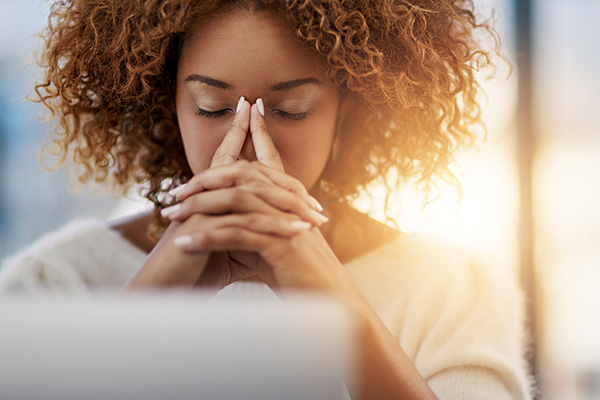anxiety
The Sacred Invitation Of A Spring Renewal
 With the first delicate buds unfurling and the air perfumed with the invigorating scent of nature’s reawakening, Spring has officially arrived. This sacred season carries with it the powerful energies of change, whispering to us of transformation, renewal and new beginnings.
With the first delicate buds unfurling and the air perfumed with the invigorating scent of nature’s reawakening, Spring has officially arrived. This sacred season carries with it the powerful energies of change, whispering to us of transformation, renewal and new beginnings.
But as exhilarating as change can be, it often comes with uncertainty, excitement, and sometimes even fear. We find ourselves at a crossroads between the comfort of the known and the vast potential of what lies ahead.
During the winter months, we instinctively retreated inward — both physically, as we sought warmth from the cold, and spiritually, as we turned our awareness inward to reflect, heal, and dream. Without even realizing it, we entered the sacred cave of our inner wisdom and nurtured the seeds of our soul’s deepest desires.
Now, as the earth awakens and the air becomes warmer, so does the essence of our being, ready to give birth to something new and profound.
Although you may not fully understand what is unfolding within you, your soul is always aware. It has been preparing you for this moment, nurturing the visions and intentions that you have been quietly cultivating in the silence of winter.
Sometimes new beginnings manifest as external changes — a career change, a move to a new home, or new relationships. Other times they unfold as inner changes — an awakening of self-love, a renewed sense of purpose, or a deepened spiritual connection.
Overcome Fear, Doubt, And Anxiety With Psychic Insight
 Fear, doubt, and anxiety have become common emotional obstacles that many of us face in our daily lives. They can cripple our decision-making abilities, cloud our judgment, and prevent us from reaching our full potential.
Fear, doubt, and anxiety have become common emotional obstacles that many of us face in our daily lives. They can cripple our decision-making abilities, cloud our judgment, and prevent us from reaching our full potential.
Whether it’s fear of the unknown, doubt about our abilities, or anxiety about what the future holds, these emotions can be overwhelming. Psychic reading offers a unique approach to navigating and overcoming these challenges, and we are here to guide you every step of the way.
Fear, doubt, and anxiety are often rooted in past experiences, limiting beliefs, and an inability to see beyond the present moment. Fear can be a natural response to real threats, but in many cases it’s just a mindset that arises when we feel uncertain about something that hasn’t even happened yet.
Doubt often stems from a lack of confidence or trust in our choices. Anxiety, on the other hand, manifests as constant worry or unease, sometimes without a clear cause, and can interfere with daily life and well-being.
These emotions often create a cycle of negativity, where one awful feeling feeds into the next, leaving you trapped in a state of uncertainty. Fortunately, a psychic reading can provide the clarity and perspective needed to break free from this cycle.
Psychic reading is a powerful way to gain deeper insight into your emotions, thoughts, and life circumstances. Gifted psychics are able to access information that is often hidden from your own conscious awareness. Revealing this information can help you better understand the root causes of your fear, doubt, and anxiety, and provide guidance on how to release them. Continue reading
Unlock The Door To Mental Freedom
 We’ve all been there — lost in thought, replaying a conversation from years ago, wishing we’d said something different, or fixating on something that hasn’t happened yet and probably never will.
We’ve all been there — lost in thought, replaying a conversation from years ago, wishing we’d said something different, or fixating on something that hasn’t happened yet and probably never will.
Our minds have a clever way of trapping us in the past, or pulling us too far into the future. In the process, we miss the beauty and joy of the present moment.
Being fully present is the key to happiness — the hidden treasure of everyday joy and fulfillment.
When we embrace the here and now, we experience true mental freedom. Instead of being burdened by past regrets or future fears, we begin to see life as it is — vibrant, alive, sometimes challenging, but always full of infinite possibilities and countless blessings waiting to be appreciated!
Think about the last time you were fully immersed in any experience. Maybe it was watching a sunset where the sky lit up with color, listening to music that made your soul soar, or laughing with a friend until your stomach hurt. In those moments, you weren’t dwelling on past mistakes or worrying about tomorrow’s to-do list — you were just there, experiencing life in real time.
Now, think about how often you are distracted by the constant pull of digital technology that keeps you from being fully present. Your phone pinging with notifications, drawing your attention away from the people and experiences around you.
Protect Yourself From Toxic Emotional Influences
 A client I read for once told me that he chose to be a loner because people always wanted something from him. “People either want money from me or they want to bend my ear with their problems,” he said. This statement struck a deep chord with me.
A client I read for once told me that he chose to be a loner because people always wanted something from him. “People either want money from me or they want to bend my ear with their problems,” he said. This statement struck a deep chord with me.
Over the years, I have noticed a significant increase in clients asking how to protect their energy. I find more people are becoming aware of how they are spiritually affected by others, especially those who bring negativity into their home or work environment.
I have had callers tell me how they come home from work exhausted – not from work, but from a toxic work environment. Even a simple telephone conversation can be draining if the person on the other end is met with an outpouring of worry, complaint, or anger. I dare not even mention the many toxic energy pitfalls of today’s dating scene!
I firmly believe that the influence of toxic energy on our systems is vastly underestimated in our daily lives. Our endocrine and nervous systems are particularly affected by our thoughts, actions, and interactions with others. A lack of emotional balance and a concern to avoid unnecessary toxic energy has undoubtedly become a priority.
Years ago in South Africa, I consulted a brilliant homeopath for what turned out to be an overactive thyroid. He diagnosed my condition using reflexology and his medical intuition. After the diagnosis, he said to me: “I’m going to give you some muti (a Zulu word for traditional medicine used in southern Africa). But until you sort out your emotional situation, it’s probably not going to make much difference.”
Prayer Is A Refuge From The Noise And Chaos
 It is easy to feel overwhelmed these days. Modern life presents many challenges, from personal struggles to global issues.
It is easy to feel overwhelmed these days. Modern life presents many challenges, from personal struggles to global issues.
We live in a world increasingly dominated by negativity, division and fear, where cruelty and hatred are not only considered acceptable, but even celebrated.
It’s really no secret to the spiritually aware person that there is an increasing battle between good and evil. Negative influences often masquerade as appealing or trendy, making it even more important to stay connected to your inner truth and divine guidance.
I often have to turn off my cell phone and television these days as I see the forces of evil growing stronger than ever. It can be hard to stay grounded in hope and clarity.
Fortunately, we have access to a variety of spiritual practices to help us stay grounded, find clarity, and maintain our inner balance. My favorite is a powerful, time-honored tradition: prayer.
While prayer is practiced in many religions and spiritual traditions, it is universal and can be embraced by anyone, regardless of their belief system. It transcends cultural and religious boundaries and is not tied to any dogma or required ritual.
Traditionally, religious prayer follows specific doctrines, but prayer is an open practice available to anyone to contemplate and express their deepest thoughts, feelings, and desires in a mindful, empowering way.
Tarot Forecast February 2025: Four Of Pentacles
 This month’s card is the Four of Pentacles, symbolizing stability, control, and a strong desire to protect one’s resources.
This month’s card is the Four of Pentacles, symbolizing stability, control, and a strong desire to protect one’s resources.
It speaks to themes of holding on to what you have earned, both materially and emotionally. However, this card also warns against becoming too protective or possessive, which can lead to stagnation and missed opportunities.
The overarching theme for the month is staying in the flow. The Four of Pentacles reminds us that while creating security and stability is important, true balance and a blessed life comes from allowing life’s energies to flow naturally.
Holding on too tightly in an attempt to control everything blocks new possibilities and opportunities, while carelessly letting go completely can lead to instability and chaos.
The challenge for February is to maintain a foundation that is both secure and adaptable — holding on to just enough to guide your path, but remaining open to the unfolding currents of life.
Traditionally, the Four of Pentacles depicts a man sitting firmly on a throne holding four pentacles or coins. He’s holding them firmly, with one balanced on his head, one in his arms, and two under his feet. This image symbolizes material attachment, greed, stinginess, and fear of loss. He is so focused on clinging to his precious possessions that he can’t concentrate on anything else.
